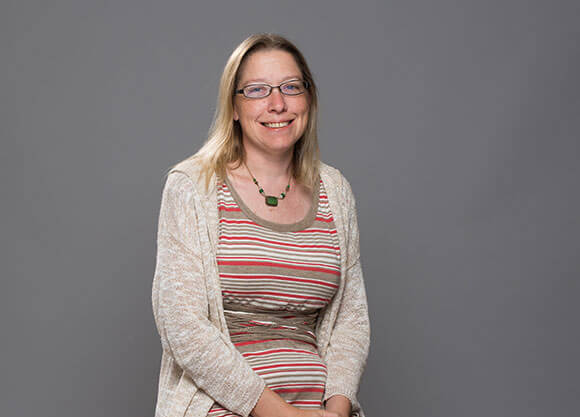
Social work professor pursuing greater understanding of rare disease
September 21, 2021

September 21, 2021

Doyle is the recipient of a 2021 Faculty Scholar Award from Quinnipiac’s Office of Academic Innovation and Effectiveness for her extensive scholarship in health social work, pediatrics, rare disease and medical social work.
Of the more than 7,000 known rare diseases, Doyle has spent the past six years delving into one in particular — a rare endocrine disease — with several of her Quinnipiac colleagues. Together, they published “Giving Credence to the Experience of X-Linked Hypophosphatemia in Adulthood: An Interprofessional Mixed-Methods Study.”
She explained that X-Linked Hypophosphatemia (XLH) is characterized by childhood rickets and defective bone mineralization. The disease is often diagnosed in childhood but causes increasing physical debilitation and pain in adulthood.
Prior to joining Quinnipiac, Doyle worked in pediatric social work and nephrology for 20 years, most recently at the Children’s Hospital at Montefiore. She is especially interested in the transition from pediatric to adult-oriented care. Her doctoral dissertation about cystinosis in emerging adulthood was recognized as dissertation of the year by the Society for Social Work and Research. Cystinosis is a rare lysosomal storage disorder caused by a buildup of cystine that causes crystals to form in the cells throughout the body and leads to kidney and eye damage.
Doyle teaches her students that as social workers, they must listen to a patient’s story and their experiences and then use what they hear to create optimal treatment plans with the patient, their family, and their interprofessional health care team.
“A social worker needs to understand how nursing looks at the world, how physicians look at the world, how to talk to physical therapists, occupational therapists and child life specialists to be able to really understand the life of a patient and their family, whether the individual is 5 or 55,” Doyle said, adding that Quinnipiac’s focus on interprofessional work in the School of Health Sciences and the Center for Interprofessional Health Care Education is what attracted her to the university.
One of the rewards of Doyle’s research is her ability to connect people with rare diseases so they feel less alone and isolated. One way she accomplishes that is at Quinnipiac’s annual Rare Disease Day, which she started with Carolyn Macica, PhD, associate professor at the Frank H. Netter MD School of Medicine at Quinnipiac.
“Although individual rare diseases may affect a small group of people, if you look at the overall number of people with rare disease, even just in the United States, it’s really equivalent to the numbers of people who have cancer or diabetes,” she noted.
A team of students will assist Doyle on her next phase of research, which involves speaking with XLH patients and their families about how they have come to understand the diagnosis and some of the decision-making involved with having children who could inherit the gene.
“Research is so much a part of who social workers are now — it’s a vital piece of the work we do. We need to be able to read and digest research and know the most recent findings, and then shape client intervention strategies with that knowledge,” she said.
Doyle has found that many students choose social work as a career because of some experience they or someone close to them had.
“Social workers really have a big mental health role within health care,” she said, adding that she sets high standards for her students, preparing them to advocate for patients and families and help them cope with the stressors that a short -or long-term illness presents.
Quinnipiac Today is your source for what's happening throughout #BobcatNation. Sign up for our weekly email newsletter to be among the first to know about news, events and members of our Bobcat family who are making a positive difference in our world.
Sign Up Now